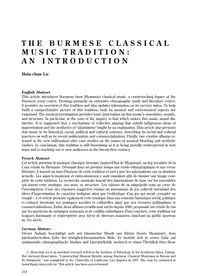
Burmese Classical Music Tradition PDF
Preview Burmese Classical Music Tradition
254 T H E B U R M E S E C L A S S I C A L M U S I C T R A D I T I O N : A N I N T R O D U C T I O N Hsin-chun Lu1 English Abstract This article introduces Burmese (now Myanmar) classical music, a centuries-long legacy of the Burmese royal courts. Drawing primarily on extensive ethnographic study and literature review, it provides an overview of this tradition and also updates information on its current status. To help build a comprehensive picture of this tradition, both its musical and extra-musical aspects are examined. The musical investigation provides basic information on this music’s ensembles, sounds, and structure. In particular, at the core of the inquiry is that which makes this music sound dis- tinctive. It is suggested that a mechanism of collective playing that entails indigenous ideas of improvisation and the aesthetics of “playfulness” might be an explanation. This article also presents this music in its historical, social, political and cultural contexts, describing its social and cultural practices as well as its recent politicization and commercialization. Finally, two creative albums re- leased in the new millennium offer case studies on the issues of musical blending and aesthetic clashes. In conclusion, this tradition is still flourishing as it is being proudly reinterpreted in new ways and is reaching out to new audiences in the twenty-first century. French Abstract Cet article présente la musique classique birmane (aujourd’hui de Myanmar), un leg séculaire de la Cour royale de Birmanie. Dressant dans un premier temps une étude ethnographique et une revue littéraire, il fournit un tour d’horizon de cette tradition et met à jour les informations sur sa situation actuelle. Les aspects musicaux et extra-musicaux y sont examinés afin de donner une image com - plète de cette tradition. La recherche musicale fournit des informations de base sur les ensembles qui jouent cette musique, ses sons, sa structure. Les raisons de sa singularité sont au cœur de l’investigation. L’une des réponses suggérées évoque un mécanisme de jeu collectif entraînant des idées d’improvisation de caractère indigène ainsi que l’esthétique d’un jeu qui serait «complet ou rempli ». Cet article présente également cette musique dans son contexte historique social, politique et culturel décrivant ses pratiques sociales et culturelles ainsi que ses récentes politisations et commercialisations. Enfin, deux albums créatifs sont sortis depuis 2000, proposant une étude de cas sur les questions de mélanges musicaux et de conflits esthétiques. Pour conclure, cette tradition est toujours florissante et réinterprétée avec fierté de diverses manières, touchant un public nouveau au 21e siècle. German Abstract Dieser Aufsatz beschäftigt sich mit klassischer Musik aus Birma (heute Myanmar), dem jahrhundertealten Erbe der königlich-birmanischen Höfe. Er bezieht sich in erster Linie auf umfassende, ethnographische Studien und Literaturkritik, wodurch er einen Überblick über diese 1. Hsin-chun Lu is an assistant research fellow at the Institute of Ethnology in the Academia Sinica, Taiwan. Her doctoral dissertation, “Constructing Musical Identity among Burmese Classical Musicians in Burma and Its Diasporas,” was completed at the University of California, Los Angeles in 2007. She may be contacted at
